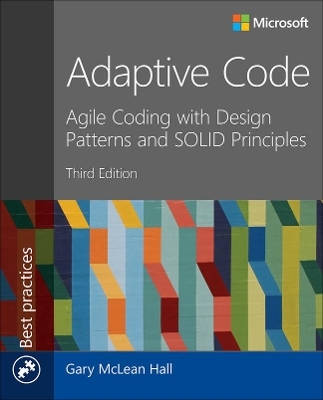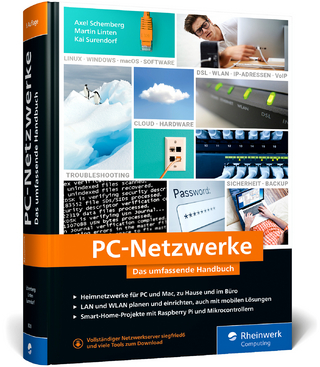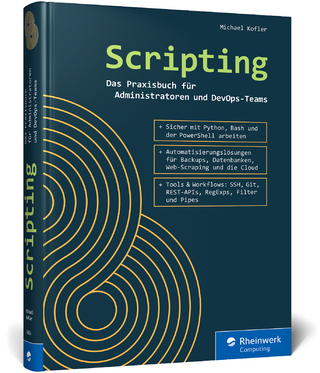
Adaptive Code
2025
|
3rd edition
Addison Wesley (Verlag)
978-0-13-689144-4 (ISBN)
Addison Wesley (Verlag)
978-0-13-689144-4 (ISBN)
- Titel wird leider nicht erscheinen
- Artikel merken
Write code that can adapt to changes.
By applying this book’s principles, you can create code that accommodates new requirements and unforeseen scenarios without significant rewrites. Gary McLean Hall describes Agile best practices, principles, and patterns for designing and writing code that can evolve more quickly and easily, with fewer errors, because it doesn’t impede change.
Now revised, updated, and expanded, Adaptive Code, Third Edition adds indispensable practical insights on Kanban, dependency inversion, and creating reusable abstractions. Drawing on over a decade of Agile consulting and development experience, McLean Hall has updated his best-seller with deeper coverage of unit testing, refactoring, pure dependency injection, and more.
Master powerful new ways to:
Write code that enables and complements Scrum, Kanban, or any other Agile framework
Develop code that can survive major changes in requirements
Plan for adaptability by using dependencies, layering, interfaces, and design patterns
Perform unit testing and refactoring in tandem, gaining more value from both
Use the “golden master” technique to make legacy code adaptive
Build SOLID code with single-responsibility, open/closed, and Liskov substitution principles
Create smaller interfaces to support more-diverse client and architectural needs
Leverage dependency injection best practices to improve code adaptability
Apply dependency inversion with the Stairway pattern, and avoid related anti-patterns
About You
This book is for programmers of all skill levels seeking more-practical insight into design patterns, SOLID principles, unit testing, refactoring, and related topics. Most readers will have programmed in C#, Java, C++, or similar object-oriented languages, and will be familiar with core procedural programming techniques.
By applying this book’s principles, you can create code that accommodates new requirements and unforeseen scenarios without significant rewrites. Gary McLean Hall describes Agile best practices, principles, and patterns for designing and writing code that can evolve more quickly and easily, with fewer errors, because it doesn’t impede change.
Now revised, updated, and expanded, Adaptive Code, Third Edition adds indispensable practical insights on Kanban, dependency inversion, and creating reusable abstractions. Drawing on over a decade of Agile consulting and development experience, McLean Hall has updated his best-seller with deeper coverage of unit testing, refactoring, pure dependency injection, and more.
Master powerful new ways to:
Write code that enables and complements Scrum, Kanban, or any other Agile framework
Develop code that can survive major changes in requirements
Plan for adaptability by using dependencies, layering, interfaces, and design patterns
Perform unit testing and refactoring in tandem, gaining more value from both
Use the “golden master” technique to make legacy code adaptive
Build SOLID code with single-responsibility, open/closed, and Liskov substitution principles
Create smaller interfaces to support more-diverse client and architectural needs
Leverage dependency injection best practices to improve code adaptability
Apply dependency inversion with the Stairway pattern, and avoid related anti-patterns
About You
This book is for programmers of all skill levels seeking more-practical insight into design patterns, SOLID principles, unit testing, refactoring, and related topics. Most readers will have programmed in C#, Java, C++, or similar object-oriented languages, and will be familiar with core procedural programming techniques.
Part 1: People & Processes
Chapter 1: “The Business”
Chapter 2: Kanban, Scrum, Agile, XP
Chapter 3: Chapter 3: People, People, People
Part 2: Development Practices
Chapter 4: Naming is Hard
Chapter 5: Testing & Refactoring
Chapter 6: Abstractions
Chapter 7: SOLID code
Part 3: Software Architectures
Chapter 8: Layering
Chapter 9: Hexagonal Architecture
Chapter 10: Domain Driven Design
| Erscheinungsdatum | 19.03.2021 |
|---|---|
| Reihe/Serie | Developer Best Practices |
| Verlagsort | Boston |
| Sprache | englisch |
| Themenwelt | Mathematik / Informatik ► Informatik ► Netzwerke |
| Mathematik / Informatik ► Informatik ► Programmiersprachen / -werkzeuge | |
| ISBN-10 | 0-13-689144-6 / 0136891446 |
| ISBN-13 | 978-0-13-689144-4 / 9780136891444 |
| Zustand | Neuware |
| Haben Sie eine Frage zum Produkt? |
Mehr entdecken
aus dem Bereich
aus dem Bereich
das umfassende Handbuch für den Einstieg in die Netzwerktechnik
Buch | Hardcover (2023)
Rheinwerk (Verlag)
29,90 €
das Praxisbuch für Admins und DevOps-Teams
Buch | Hardcover (2023)
Rheinwerk (Verlag)
39,90 €


